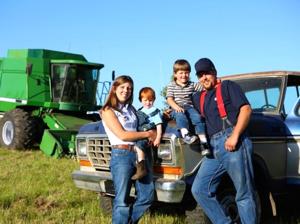Resist the urge to jump into decision-making mode, says Froese. Instead, view your first discussions as opportunities for gathering information about your family’s hopes and dreams

In her long career helping farm families, succession specialist Elaine Froese has found certain words and actions can help launch the succession process, while others can quickly distract or even permanently stop the process.
1. Don’t wait for a crisis before you start the conversation.

It might be too late to make adequate plans, and family members may not feel emotionally able to talk. Pick a positive, comfortable environment during a period of relative calm.
2. Don’t gossip.

Instead of talking through other people, speak directly to the person involved. Better still, have formalized discussions to unpack tough issues.
3. Don't try to read people’s minds.

Assumptions create confusion and mistrust. Look each other in the eye and ask deeper “What if?” questions.
4. Don’t expect the other person to start the conversation.

Either generation may get things going. Keep in mind that it’s just a conversation. It does not need to reach a conclusion. Initially, think of it more as an information-finding mission.
5. Don’t expect your advisers to come up with all the solutions.

“They can give guidance, but ultimately the choices are yours as the owners to make the decisions that work best for you,” says Froese.
6. Don’t use abrasive comments or language.

The next generation needs to show up with respectful behaviour and gratitude for the opportunity being given, says Froese. Strong words can shut the conversation down. “Do not use ‘you always’ or ‘you never’,” she says.
7. Don’t assume or enforce an age restriction.

Age is not an indicator of passion. It depends on what each person brings to the discussion.
8. Don’t keep family secrets or surprises.

It’s a sign of family trust and respect to let the non-farming children hear the passion and vision for the farm business plan. They’re very astute as to the players, personalities and issues, and can be a great resource for creating solutions. Let them decide the level of involvement they want. “They probably have other skills that can translate to great support for the farm, for example, internet research, strategic thinking, systems and process management,” says Froese.
1. Do know your income.

Know the retiring farm couple’s income stream needs. Where do they want to live? What’s the size of their personal wealth?
2. Do know the financial viability of the farm.

Know the financial viability of the farm and share it with the next generation. How many families, and at what lifestyle income level, can this farm business support? The older generation should share farm financial information with the next generation. Froese says knowing about debt servicing, cash flow and input costs is a great education in reality for teens.
3. Do come with a workable vision.

The older generation couple should start by agreeing together before they even talk to successors. Froese says farmers often reject thinking about the future because of fear of getting older and change.
4. Do clearly state why you’re initiating these talks.

This might include why you want to get involved in helping make transition plans, for example, out of concern that proper plans are in place and understood. Stress the importance and benefits of this conversation to everyone.
5. Do use someone else’s story to get started.

Real stories can be big motivators. Froese finds it helps to normalize the fears and the apprehensions families feel when they ask for help. She lets her clients know she has seen this many times before and they’re not alone.
6. Do listen actively, and carefully respond to concerns.

It’s important to keep moving forward. Start it up softly with “I’ve been thinking… ” statements.
7. Do ask more powerful questions.

“What do you want...?” or “What if?” questions. Froese suggests keeping notes on your phone or on paper as new solutions strike you and actively look and compile transition ideas from advisers, magazines and examples of other successful farm transitions.
8. Do understand debt.

How much debt can the next generation have and still sleep at night, as they are going to be shouldering the debt of buying out some assets. Some assets will be gifted, but don’t expect it all to come your way. The non-farm heirs can have assets like land that they lease to the farm kids with long-term rental.











